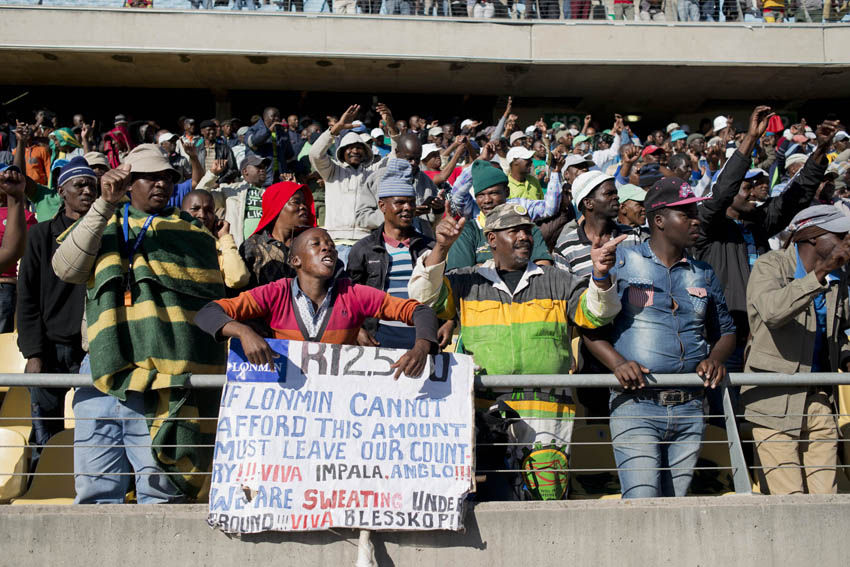Telkom’s Alphonzo Samuels
The Association of Mineworkers and Construction Union (Amcu) could sign on the wage agreements as early as Wednesday, officially ending the historic five-month strike which started on January 23, according to its general secretary Jeff Mphahlele.
The announcement, made at a mass meeting at the Royal Bafokeng Stadium in Phokeng, outside Rustenburg, came as the Labour Court ruled against Amcu’s efforts to stage a strike in the gold sector as its members accepted wage offers settled by the National Union of Mineworkers and the Chamber of Mines in 2013.
President Joseph Mathunjwa on Monday received an overwhelming mandate from workers who had filled about two-thirds of the stadium.
But he made no direct mention of the clauses that were not attained, instead, training attention on Amcu’s victories.
Mathunjwa announced three-year deals for all the mining houses – Lonmin, Amplats and Implats.

Lonmin’s lower band workers would receive R1 000 annual increases each for three years, while Anglo American Platinum and Impala Platinum workers on the same levels would receive R1 000 increases for the first two years before receiving R950 in the last year.
Mathunjwa also announced increases to living-out allowances for some houses, with Anglo workers particularly elated at an increase of the living out allowance from R1 733 to R2 000. Anglo also pledged to support its workers with transport, food parcels and food supplements for a month, and to help eradicate illegal garnishee orders.
Mathunjwa also announced that the 236 essential services workers who were fired from Lonmin had been reinstated. “Only a fool can ask us what happened to our R12 500 demand,” Mathunjwa said, somewhat defensively.
“In other mines, workers have been signing for R400 [increases] over two years. What has taken other unions 20 years to achieve, we did it in five months. Some workers are going to get to that R12 500 in less than three years, others even sooner than that.”
On the difficult subject of some of the conditions apparently demanded by the union’s members, such as the dropping of criminal charges related to the strike, the Amcu president’s speech seemed a preplanned exercise in obfuscation, omission and, at times, pure fabrication. Mathunjwa made no mention of the all-important proposal of a three-year moratorium on retrenchments, meaning that door was still wide open and could hollow out the gains made by the strike, and saying only that several major concessions were acceded to, including some civil cases that were lodged by the mining houses.
There was a point when Mathunjwa avoided talking about Lonmin backpay.

(Pictures by Oupa Nkosi, M&G)
In a long, self-congratulatory speech, the Amcu president took swipes at people who he felt had attempted to discredit the union and the strike. He derided Amcu apostates who loudly voiced their misgivings about the prospects of the strike when it began, saying their efforts were buried by the strike.
Mathunjwa derided new Mineral Resources Minister Ngoako Ramathlodi, whom he said tried to ride roughshod over the strike by promising to end it in three days.
“The world called you uneducated,” he said, addressing the workers. “But you taught the entire world a lesson.”
He also extended his gratitude to academics and humanitarian organisations that either wrote arguments in favour of the workers’ demands or supplied food to stem what was becoming a crippling humanitarian crisis in Rustenburg and the surrounding towns.
Skills
Mathunjwa ventured to call the strike peaceful during his speech, which seems to suggest that the handful of recent deaths during the industrial action did not register with the union, or that as a country, we have accepted the deaths of a few people during a strike as inevitable.
He said the union’s work was far from over as they were still under threat from attempts to alter the labour relations laws. A Business Day story about a recent colloquium to curb long and violent strikes in the mining, says one of the suggestions out the colloquium was that mandatory strike balloting be enforced as many unions had that clause in their constitutions.
Amcu’s strike ballot, the same one used to canvass the strike in the beginning, involved Mathunjwa carving up the stadium into sections and then asking the crowd “yes or no”. It happens so fast that if you blink you could miss it and does not allow for individual expression. It merely fosters group-think.
Independent labour analyst Albert de Beer said one of the reasons the strike took so long was that labour lacks, both on the management side as well as on the union side, the basics of negotiation skills.
“First you have to agree on principles, that’s what people who are exceptionally good negotiators do. Then the details became easy. Nowadays, employers and unions storm in there and don’t think things through. They just start with their proposals and counter-proposals. There is a lack of training in negotiation, and most of the seminars on offer are on positional bargaining.”